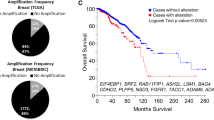Abstract
Background: Initiation factor eIF4E binds to mRNA as the initial step for protein translation. Overexpression of the eIF4E oncoprotein has been found in breast cancer but not in benign breast tissue. The objective of this study is to determine if eIF4E oncoprotein overexpression is associated with eIF4E gene amplification in breast cancer using Western blots and competitive polymerase chain reaction (PCR).
Methods: Unknown concentrations of DNA extracted from breast specimens were amplified by PCR using a set of primers spanning intron 2/exon 3 of the eIF4E gene. In the same PCR tube, an internal control consisting of a known concentration of an eIF4E DNA template with 20-base pair (bp) deletion was used as the competitive reference standard (CRS) for competitive PCR. Gel electrophoresis of the PCR products was performed and the bands quantified by densitometry. eIF4E gene amplification was then determined relative to a nonamplified gene (gastrin). Using an anti-eIF4E rabbit antibody, Western blots were performed on benign and malignant breast specimens. Quantification was accomplished by developing blots with a color assay using nitro blue tetrazolium (NBT) and 5-bromo-4-chloro-3-indolyl phosphate (BCIP), scanned and analyzed by densitometry.
Results: Twenty-two breast specimens (14 cancer, 8 control) from patients were examined for eIF4E gene amplification and oncoprotein expression. In all fourteen specimens from stage I–III breast cancer patients, eIF4E overexpression was detected at 3- to 30-fold (16.71±7.83) elevations. Similarly, all 14 specimens demonstrated eIF4E gene amplification by competitive PCR (3.69±1.27). In the eight benign breast specimens examined, all were negative for eIF4E overexpression and gene amplification.
Conclusions: Overexpression of eIF4E was associated with eIF4E gene amplification in breast cancer specimens. No overexpression or gene amplification was detected in benign breast tissues. eIF4E gene amplification may be one mechanism for eIF4E oncoprotein overexpression.
Similar content being viewed by others
References
Rhoads R. Regulation of eukaryotic protein synthesis by initiation factors.J Biol Chem 1993;268:3017–20.
Sonenberg N. mRNA 5′ cap-binding protein eIF-4E and control of cell growth.In Hershey J, Mathews M, Sonenberg N, eds.Translational control. New York: Cold Spring Harbor Laboratory Press, 1996;245–70.
Jansen M, Moor CD, Sussenbach J, Brande JVD. Translational control of gene expression.Pediatr Res 1995;37:681–6.
DeBenedetti A, Rhoads R. Overexpression of eukaryotic protein synthesis initiation factor 4E in HeLa cells results in aberrant growth and morphology.Proc Natl Acad Sci USA 1990;87:8212–6.
Anthony B, Carter P, DeBenedetti A. Overexpression of the proto-oncogene/translation factor 4E in breast carcinoma cell lines.Int J Cancer 1996;65:1–6.
Kerekatte V, Smiley K, Hu B, et al. The proto-oncogene/translation factor eIF-4e: a survey of its expression in breast carcinomas.Int J Cancer 1995;64:27–31.
Kevil C, Carter P, Hu B, DeBenedetti A. Translational enhancement of FGF-2 by eIF-4 factors, and alternate utilization of CUG and AUG codons for translation initiation.Oncogene 1995;11:2339–48.
Rosenwald I, Lazaris-Karatzas A, Sonenberg N, Schmidt E. Elevated levels of cyclin D1 in response to increased expression of eukaryotic initiation factor 4E.Mol Cell Biol 1993;13:7358–63.
Guerin M, Barrois M, Terrier M, et al. Overexpression of eitherc-myc or c-erB-2/neu proto-oncogenes in human breast carcinomas: correlation with poor prognosis.Oncogene Res 1988;3:32.
Slamon D, Godolphin W, Jones L, et al. Studies of the HER-2/neu proto-oncogene in human breast and ovarian cancer.Science 1989;244:707–12.
Xia W, Lau Y, Zhang H, et al. Strong correlation between c-erbB-2 overexpression and overall survival of patients with oral squamous cell carcinoma.Clin Cancer Res 1997;3:3–9.
Higuchi R. Using PCR to engineer DNA. In: Erlich H, ed.PCR technology: principles and applications for DNA amplification. New York: Stockton Press, 1989:61–70.
Li B, Harlow S, Budnick R, et al. Detection of HER-2/neu oncogene amplification in flow cytometry-sorted breast ductal cells by competitive polymerase chain reaction.Cancer 1994;73:2771–8.
Rychlik W, Domier L, Gardner P, et al. Amino acid sequence of the mRNA cap-binding protein from human tissues.Proc Natl Acad Sci USA 1992;89:1148.
Wang A, Mark D, Quantitative PCR. In: Innis M, Gelfand D, Sninsky J, White T, eds.PCR protocols: a guide to methods and applications. San Diego: Academic Press, 1990:70–5.
Champeme MH BI, Hacene K, Lidereau R. Int-2/FGF-3 amplification is a better independent predictor of relapse than c-myc and c-erb-2/neu amplification in primary human breast cancer.Mod Pathol 1994;7:900–5.
Li BDL LL, Dawson M, DeBenedetti A. Overexpression of eukaryotic initiation factor 4E (eIF4E) in breast cancer.Cancer 1997;79:2385–90.
Levitt S, Aeppli D, Nierengarten M. The importance of local control in the conservative treatment of breast cancer.Acta Oncol 1995;34:839–44.
Weinberg R. Oncogenes, antioncogenes, and the molecular bases of multistep carcinogenesis.Cancer Res 1989;49:3713–21.
Author information
Authors and Affiliations
Rights and permissions
About this article
Cite this article
Sorrells, D.L., Black, D.R., Meschonat, C. et al. Detection of eIF4E gene amplification in breast cancer by competitive PCR. Annals of Surgical Oncology 5, 232–237 (1998). https://doi.org/10.1007/BF02303778
Received:
Accepted:
Issue Date:
DOI: https://doi.org/10.1007/BF02303778




